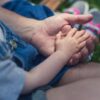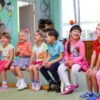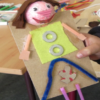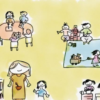Author Archive: Portugal - primeirosanos.pt

1st grade is about to start – And now? Building a portfolio to support children’s transition
This message was contributed by Manuela Sanches-Ferreira, from Escola Superior de Educação, Instituto Politécnico do Porto. When Manuel is upset, he throws a tantrum, cries and tosses objects, he may even hit his class mates. He is impatient, and his attention span is short, which makes him shift activities frequently; he seldom communicates and…
Read more
Walk the line: Children-at-risk and how to protect them?
This blog post was contributed by Manuela Pessanha (ESE-Instituto Politécnico do Porto) “Children are a people and they live in a foreign land”] (Beppe Wolgers, 1956) During the first years of life, children are fully dependent on adults that take care of them and are responsible for satisfying their needs. If the satisfaction of these…
Read more
Early childhood education and sustainable development goals
This post was contributed by Tiago Almeida (ESELx). The Millennium Development Goals only considered children with reference to child mortality and maternal mortality. While important, both indicators are insufficient to ensure the future well-being of children and families. Beyond survival, children have the right to thrive, to develop their full potential and to live in…
Read more
How to prevent children’s challenging behaviors in early childhood education
This blog post was contributed by Carla Peixoto (inED). Preschool teachers often worry about how to manage children’s challenging behaviors, such as throwing objects, disrupting other children’s activities, hitting, etc. While in some cases challenging behaviors are brief and easy to manage, in others they are persistent and intense. The latter may interfere in a…
Read more
Inclusive Environments: A Tool for Self-Reflection
This blog post was contributed by Cecília Aguiar (ISCTE-IUL). We all want to do better for children and their families. We all aim for inclusive education. Because of that, multiple initiatives, projects, actions, and agencies for the promotion of inclusive education emerge across Europe. Some organizations and projects actually cross the borders of countries, allowing…
Read more
Listen to my idea, we could do it together! Cooperative tasks and child participation
This blog was contributed by Tandem Team (http://tandemforfour.weebly.com/) and translated by Carlos Pereira and Marina Fuertes (Escola Superior de Educação de Lisboa). From their early years, children can be involved in daily tasks such as helping bake a cake, gardening, or taking care of a dog. Children learn to perform a task, to cooperate,…
Read more
Girls do karate… And boys ballet
This blog post was contributed by Nadine Correia (ISCTE-IUL). Children classify, from an early age, the world surrounding them, in order to better understand it and to assign it meaning. The concept of gender is one of the first categories that children learn. ECE teachers, family members, peers, and other agents of socialization play a key role…
Read more
“Boys and girls can choose what they want to do”: Children’s right to participate in ECE
This blog post was contributed by Nadine Correia (ISCTE-IUL). “This classroom is so beautiful because the teacher listens to children. Boys and girls can choose and do what they want to”(A., 5 years old). Children’s right to participate has gained progressive recognition and visibility in different fields of knowledge. In the research field, this is…
Read more
Three reasons to value the first languages of all children in the classroom
Not all children attending early childhood education classrooms speak the same first language. What to do when children express themselves in their mother tongue, and not in the language of instruction? If we invest in the first language (i.e., the mother tongue), can we delay learning the language of instruction or, conversely, can we foster the successful development of the two languages? How to respond to immigrant or ethnic minority parents when they ask what they should do at home to promote language development in general or to promote the learning of the language of instruction?
Read more
“What does the child have?” – 6 questions about the meaning of a child’s diagnosis
“We still don’t know what the child has…”, told me a teacher about the difficulties she was experiencing with a child who demonstrated behavioural problems. That sentence kept me wondering. Gathering information about what the child “has”, i.e., trying to know “his/her” diagnosis, underlies a genuine concern. But are those difficulties due primarily to something he/she “has”? To what extent knowing the diagnosis is essential to plan interventions at home, daycare or kindergarten?
Read more